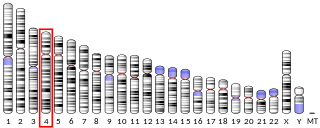
Protocadherin-1 is a protein that in humans is encoded by the PCDH1 gene.

Tetraspanin-31 is a protein that in humans is encoded by the TSPAN31 gene.

Protocadherin-7 is a protein that in humans is encoded by the PCDH7 gene.

Major facilitator superfamily domain-containing protein 2 -- also known as sodium-dependent lysophosphatidylcholine symporter 1 -- is a protein that in humans is encoded by the MFSD2A gene. MFSD2A is a membrane transport protein that is expressed in the endothelium of the blood–brain barrier (BBB) and has an essential role in BBB formation and function. Genetic ablation of MFSD2A results in leaky BBB and increases central nervous system endothelial cell vesicular transcytosis without otherwise affecting tight junctions. MFSD2A is an atypical SLC, thus a predicted SLC transporter. It clusters phylogenetically to AMTF8.

CKLF-like MARVEL transmembrane domain-containing protein 2, previously termed chemokine-like factor superfamily 2, is a member of the CKLF-like MARVEL transmembrane domain-containing family (CMTM) of proteins. In humans, it is encoded by the CMTM2 gene located in band 22 on the long arm of chromosome 16. CMTM2 protein is expressed in the bone marrow and various circulating blood cells. It is also highly expressed in testicular tissues: The CMTM2 gene and CMTM2 protein, it is suggested, may play an important role in testicular development.

Tumor necrosis factor receptor superfamily member 27 is a protein that in humans is encoded by the EDA2R gene.

von Willebrand factor A domain-containing protein 2, also known as A domain-containing protein similar to matrilin and collagen (AMACO), is a protein that in humans is encoded by the VWA2 gene.

Major facilitator superfamily domain containing 8 also called MFSD8 is a protein that in humans is encoded by the MFSD8 gene. MFSD8 is an atypical SLC, thus a predicted SLC transporter. It clusters phylogenetically to the Atypical MFS Transporter family 2 (AMTF2).

Unc-93 homolog A is a protein that in humans is encoded by the UNC93A gene.

Disrupted in renal carcinoma 2 is a protein that in humans is encoded by the DIRC2 gene.

Major facilitator superfamily domain containing 7 is a protein that in humans is encoded by the MFSD7 gene.

CKLF like MARVEL transmembrane domain-containing 7, previously termed chemokine-like factor superfamily 7, is a protein that in humans is encoded by the CMTM7 gene. This gene, which is located in band 22 on the short arm of chromosome 3, and the protein that it encodes belong to the CKLF-like MARVEL transmembrane domain-containing family. Through the process of alternative splicing, the CMTM7 gene encodes two isoforms, CMTM7-v1 and CMTM7-v2, with CMTM7-v1 being the main form expressed and studied. CMTM7 proteins are widely expressed in normal human tissues.

Major facilitator superfamily domain containing 14A is a protein that in humans is encoded by the MFSD14A gene. MFSD14A is an atypical solute carrier of MFS type. HGNC:23363

Major facilitator superfamily domain containing 1 is a protein belonging to the MFS Pfam clan. It is an Atypical solute carrier.

Major facilitator superfamily domain containing 5 is an atypical SLC expressed in neuronal plasma membrane. It is a plausible Solute carrier transporter. It transports molybdate anions, and it interacts with GLP-1R.

Major facilitator superfamily domain-containing protein 9 is a protein that in humans is encoded by the MFSD9 gene. It is a potential solute carrier, and called atypical solute carrier since it is not named according to the SLC nomenclature. It is expressed both in central and peripheral organs.

Major facilitator superfamily domain containing 4A is a protein belonging to the MFS Pfam clan. It is an atypical solute carrier, thus a plausible SLC transporter in humans. MFSD4A has been identified in both central and peripheral areas.

PCI domain containing 2 is a protein that in humans is encoded by the PCID2 gene.

YTH N6-methyladenosine RNA binding protein 2 is a protein that in humans is encoded by the YTHDF2 gene.

Major facilitator superfamily domain containing 6 like (MFSD6L) is a protein encoded by the MFSD6L gene in humans. The MFSD6L protein is a transmembrane protein that is part of the major facilitator superfamily (MFS) that uses chemiosmotic gradients to facilitate the transport of small solutes across cell membranes.















